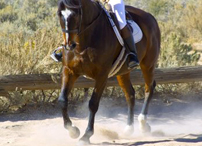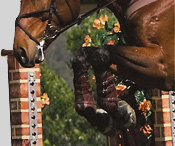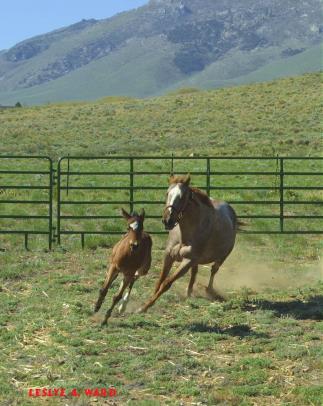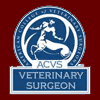



"Building healthy partners"
Spring Hormonal Confusion!


Spring Transistional Period
(aka Crazy Mare Time)
Last week a client called about a performance mare who kept posturing to urinate and looking back at her left flank, but had a great appetite and normal manure. Another trainer called because a normally cooperative mare was kicking out when asked to canter. Upon investigation, I discovered that both these mares’ problems were related to the seasonal nature of the equine reproductive cycle.
Seasonal variation in daylight has a profound influence on the mare’s reproductive performance. Increasing day length improves the mare's reproductive efficiency while shortened days disrupt reproductive regulation. Daylight stimulates the production of melatonin by the brain’s pineal gland, which in turn starts a complex cascade of hormonal events which influence the ovaries to develop and release follicles. For successful conception to occur, an egg must ovulate, be fertilized, and arrive in a uterus which is ready to accept and nourish it. No simple task.
The transition from the short days of winter when most mares stop cycling all together, to the long days of June, when fertility is at its highest, is a gradual process. During the spring and fall, mares enter a period of anovulatory receptivity, or the transitional period. At this time, they often exhibit erratic estrus behavior, and while they appear to be in standing heat and accept a stallion, there often is not an associated ovulation of a mature follicle. When a transitional mare does ovulate appropriately, if the hormonal sequence necessary to maintain the critical early critical of pregnancy is unbalanced, the embryo may be lost. Particularly in the spring, this transitional period is characterized by long, erratic heat cycles without ovulation.
No wonder mares may act whacky in Feburary! Not only are they dealing with hormonal imbalance, they also may experience ovarian pain associated with large, non-ovulating follicles.
Mares with placid dispositions may not seem affected by the ups and downs of hormonal transitions while others are truly distressed during these phases. Some performance horses exhibit irritable behavior and are difficult to train. Trainer’s may seek ways to stabilize reproductive activity and help these troubled mares achieve behavioral balance. There are many oral supplements available over the counter which claim to improve the demeanor of irritable mares,and subcutaneous cattle hormonal implants have been used, but none of these methods have any scientific basis. Compounded injectable progesterone in olive oil can be used intramuscularly but the injections are irritating and yield variable results. There is a well researched long acting altrenogest injection manufactured by BET Pharm, however the cost is prohibitive for many clients.
The gold standard for preventing cycling remains the daily administration of oral Altrenogest, a synthetic progesterone (Regu-Mate or Altresyn).
Once the transitional period is over and mares are cycling regularly, reproductive efficiency rapidly improves. Performance horses exhibit improved behavior and brood mares conceive successfully. The "normal" mare has a 21 day heat cycle. She is not receptive for 14-15 days (diestrus), then comes into heat for 4-7 days (estrus), ovulating 12-24 hours before behavioral signs of estrus disappear.
So, when your mare is acting like a maniac this month, remember that her behavior may be due to "raging hormones"! Speak with me about management practices that may improve your breeding success or help your mare's disposition.
PO BOX 60730
RENO NV 89506
EMERGENCY (775) 742-2823 OFFICE (775) 969-3495
FAX (775) 969-3923




